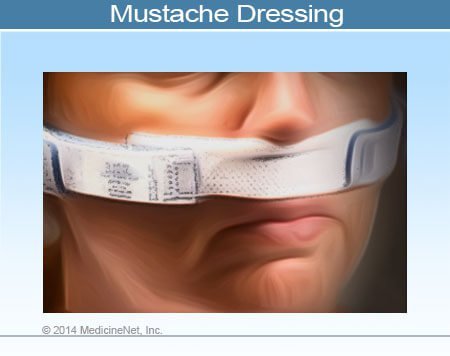What happens after sinus surgery (pictures)?

Picture of Mustache Dressing
After surgery, the patient will be taken to the recovery room where a nurse will monitor the patient’s vital signs. Usually, patients will be able to go home the same day as the surgery once they have fully recovered from the anesthetic. This usually takes several hours. Patients will need a friend or family member to pick them up from the surgical facility. Someone (a responsible adult) should spend the first night after surgery with the patient in case any post-surgical problems develop.
On arrival at home from the surgical facility, the patient should go to bed and rest with their head elevated on two to three pillows. By keeping the head elevated above the heart, edema and swelling from sinus surgery can be minimized. Patients may get out of bed with assistance to use the bathroom but should avoid straining with bowel movements because this may cause some surgical site bleeding. If the person is constipated, they should take a stool softener or a gentle laxative.
Some patients may have noticeable swelling of the nose, upper lip, cheeks, or around the eyes for several days after surgery. This swelling is normal and will gradually go away. People can help reduce it by putting an ice pack on the face, bridge of the nose, and eyes as much as tolerated. This will also help with postoperative edema and pain. Some patients have found frozen vegetables in packages (for example bags of frozen peas) to be a convenient ice pack that nicely conforms to the face. The frozen material should be separated from the skin by a towel or similar barrier to avoid any skin damage. Many clinicians suggest periods of 15 minutes of such ice-pack treatment followed by 15 minutes of removal to not damage the skin.
Moderate bleeding from the nose is normal and will gradually decrease. The gauze dressing (“mustache dressing”) will collect blood and should be changed as needed. It is not unusual to change these dressings every hour during the first 24 hours after surgery. It is recommended to purchase gauze pads prior to surgery so that the patient will have enough for dressing changes. After a few days, the patient will probably not need to use the dressing any longer. Do not take aspirin, aspirin-containing medications, or nonsteroidal anti-inflammatory medications (such as ibuprofen/Advil, Naprosyn, and others) for as long as the surgeon has instructed following surgery, because such medications may increase bleeding and slow clotting at the surgical site.
It is best to eat a light, soft, and cool diet as tolerated once the patient has recovered fully from the anesthetic. Avoid hot liquids for several days. Even though people may be hungry immediately after surgery, it is best to go slowly to prevent postoperative nausea and vomiting. Occasionally, patients may vomit one or two times immediately after surgery. If vomiting persists, please contact the surgeon; the doctor may prescribe medication to reduce or eliminate vomiting. It is important to remember that a good overall diet with ample rest promotes healing.
Patients may be prescribed antibiotics after surgery and should finish all the pills that have been ordered. Some form of a narcotic may also be prescribed and is to be taken as needed for pain. If the patient requires narcotics, they should not drive and should consider having a responsible person stay with them. In some situations, the doctor may give steroids to be taken either before or after surgery. Take this medication as prescribed, and not discontinue it prematurely. The steroids are instrumental in facilitating proper healing. If patients have any questions or they feel that they are developing a reaction to any of these medications, he or they should consult their doctor immediately. Patients should not take any other medication, either prescribed or over-the-counter unless they have discussed it with the doctor.
How long does it take to recovery from sinus surgery?
How long it takes for recovery depends on the extent of the surgery. Recovery may take a few days. It may take up to 3 to 5 days to feel complete and back to normal. Patients should refrain from activities that increase heart rate or blood pressure such as running, exercising weight lifting, or other similar activities. It is imperative to obtain guidance from the surgeon as to when they may resume all normal activities. Until this time, patients should rest and limit physical exertion to improve recovery.